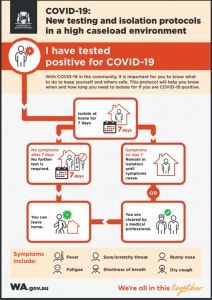The State Government today released the rules under which businesses will operate while COVID-19 is present in WA in an important step forward for businesses.
The announcement comes as a CCIWA survey found 65 per cent of respondents expect the delay in WA’s border reopening to have a ‘negative’ or ‘extremely negative’ impact, with the inability to recruit staff, reduced capacity to manage operations and lost customer sales cited as key concerns.
See the survey results here.
Having clarity on testing and isolation rules is critical for many WA businesses, better enabling them to plan their operations, organise their staff and invest to prepare for an increased presence of COVID in the community.
Premier Mark McGowan said the rules will come into force when the State reaches a “high caseload environment,” based on the judgement of government and health officials.
Who will be considered a ‘close contact’ of a COVID case?
A person who:
- Shares their household
- Is their intimate partner
- Has spent 15 minutes or more ‘face-to-face’ with them, without masks
- Has spent 2 hours in a small room with them, without a mask
- Or anyone notified by WA Health, based on other circumstances
Being at an exposure site at the same time as a COVID case will not automatically require you to get tested and go into isolation.
For how long should a positive case isolate

A COVID-19 rapid antigen test (RAT) showing a negative result.
- A confirmed COVID case:
- Isolate for 7 days, or as long as you keep showing symptoms. After that, you may leave isolation without a test.
- A close contact, showing symptoms:
-
- Isolate for 7 days from the point of contact.
- Get a PCR or a RAT after 24 hours, and on Day 7 of isolation.
- If you return a positive result, see 1.
If negative, isolation ends.
-
- A close contact, without symptoms:
- Isolate for 7 days from the point of contact.
- If you develop symptoms, get a RAT test and isolate until your results come in.
- If you return a positive result, see 1
- If negative, isolation ends.
- If you have COVID symptoms:
- Get a COVID test and isolate until symptoms clear.
- If positive, see 1.
- If a negative result is returned by a RAT test, maintain isolation for 24 hours and take a 2nd RAT test.
- If negative and clear of symptoms, isolation ends.
See: Testing and Isolation Protocols in a high caseload environment.
Critical workers
Businesses will have to register any critical workers among their employees in an online system the Government is developing.
Critical workers will be able to keep working, even if they’re a close contact. However, they will to return a negative COVID test, wear a mask, and isolate when they’re not working. If they develop symptoms, they must go into isolation and follow the same rules (1-4) listed above.
Critical workers will be those who can’t work from home and:
-
- Work on COVID-19 response, or preventing harm to individuals or the community (eg nurses, paramedics);
- Work in the following specialist roles:
- transport, freight and logistics, public transport (eg truckies, bus drivers);
- food, beverage and pharmaceutical manufacturing, supply and retail (eg supermarkets, pharmacists);
- Servos and truck stops;
- Agriculture (for the purpose of food supply and biosecurity);
- Mining, power, utilities and waste management services;
- Building and construction;
- Prisons
- Police and emergency services;
- Schools and childcare;
- Health care services;
- Social assistance and residential care;
- Vets;
- Defence;
- Funeral, crematorium and cemetery services.
CCIWA CEO Chris Rodwell said the announcement of key rules by which WA will operate once COVID caseloads increase is an important step forward for businesses.
“CCIWA appreciates the additional detail now available, particularly on subjects such as close contacts, isolation and critical workers,” he said.
“It is important to note that these rules come into effect once a ‘high’ or ‘very high case’ threshold has been reached. To understand how workable these rules will be, it is critical we understand these thresholds.”
The CCIWA survey also found:
- Many businesses report multi-million dollar losses, with an average cost of $2.5 million estimated by respondents.
- Businesses most likely to report a negative impact from the delay are in the agriculture, manufacturing, construction, ICT and professional services sectors.
- Businesses in the health and community services sector were the most likely to report a positive impact (44 per cent) from the delayed reopening, mostly due to concern around the need to furlough staff as the Omicron variant spreads.
- 72 per cent of respondents indicated a “negative” impact on WA’s competitiveness relative to other states from the delayed reopening.
- Just 23 per cent of respondents indicated the delay will have a positive impact.
For general advice on your individual situation call CCIWA’s Employee Relations Advice Centre on (08) 9365 7660 or via [email protected].
For legal advice specific to your situation, contact our team of Workplace Relations lawyers on (08) 9365 7746 or via [email protected].












